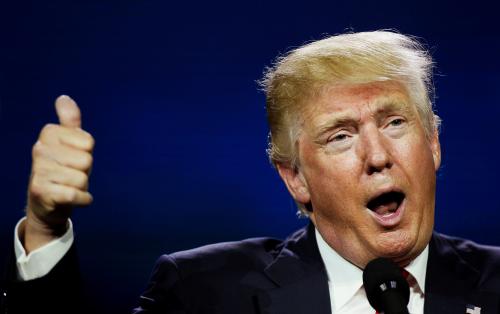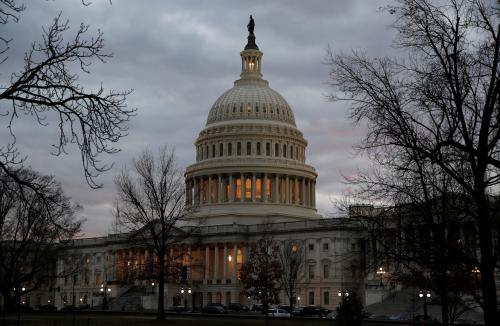In politics, a “lame duck” usually refers to a president in that period of time after an election and before the inauguration of a successor. But rarely does “lame duck” refer to a sitting president about to go into a re-election campaign. Nonetheless, President Trump’s tenure seems to be slipping into a premature lame duck period.
The most important characteristic of lame duck-ness is that even your friends and supporters stop paying attention to your wishes and defy you in acts if not just in words. There’s an awful lot of that going on in Trumpworld lately.
Signs of a lame duck presidency arose around Congress’s summer to-do list. The first was passage of the behemoth NDAA (National Defense Appropriations Act) which funds our military. This bill was moving along in its typical bipartisan fashion until it acquired a provision that would remove the names of Confederate military leaders from American military bases. Senate Republicans were the first to balk, signaling very clearly that they opposed vetoing the bill over that provision. Then, last week, the House voted on the bill in spite of the fact that Trump had threatened to veto it just hours before. It passed 295 to 125, including enough Republicans to make it veto-proof. Days later, the Senate approved a similar bill (with the military base-name change provision included) by a lopsided vote of 86-14, a second veto-proof vote—with only four Republicans voting no.
Trump’s lame duck status also showed up in the debate over what kind of stimulus bill should be passed. His first idea was to lower the payroll tax. That tax funds Social Security payments, and a cut is sometimes proposed but it is rarely taken seriously. It wasn’t this time, either. Even as it became apparent that Senate Republicans were lukewarm at best, the White House kept on. The White House has since dropped the idea.
Even more bizarre was Trump’s opposition to $25 billion in funding for federal health agencies and for coronavirus testing. Senate Republicans proposed this funding and the lack of White House support was reported to have “infuriated” them.
On another front, throughout this summer Trump has been insisting that schools open in the fall and he has been threatening withhold federal funding if they don’t. He forced the CDC to go back to the drawing board because he didn’t like their initial guidelines about school reopening. But the little secret here is that presidents have very little to do with school policy. Even if Trump could cut off funds, federal funding is a miniscule portion of funding for schools: 8.3% to be exact. Most school funding is from state and local sources. School districts around the country are wrestling with the health concerns around opening but they are pretty much ignoring the president. Even the private school his son Barron attends has announced that it will either open up online only or in some sort of hybrid fashion. So much for Trump’s influence over schools.
Trump has also been waging a campaign against mail-in ballots, contending without evidence that elections held by mail are at risk for corruption. But like education, the president has very little to say about voting methods. Those are left up to the states. And in spite of the president’s protests, states are moving towards easing up restrictions on absentee ballots and more and more states plan to send out applications for absentee ballots to all voters. This is not a Democratic plot to steal the election as Trump would have us believe. In Kentucky, for instance, the Republican Secretary of State Mike Adams encouraged voters to vote by mail for its June 23 primary. And Republican Secretary of State of Ohio Frank La Rose just announced that he will be sending absentee ballot applications to all voters in the state come November. It seems that, in typical fashion, Trump has forgotten that there are other Republicans on the ballot besides himself.
So, Trump can’t get what he wants out of Republicans in Congress and he can’t get what he wants out of state and local school boards and state election boards. But he can’t even get what he wants from his own national party organization. For months he insisted that he would have a huge, in-person convention in Charlotte, North Carolina. But as the Democratic governor and others expressed alarm at their ability to host that many people during a pandemic, Trump abruptly pulled the convention (or at least the exciting parts of it) out of Charlotte. He soon found a more hospitable venue in Jacksonville, Florida. But as the virus grew in Florida, officials there grew increasingly worried and Trump opted to cancel the convention. The Republican mayor expressed his gratitude to Trump for staying away from their city. Now the Republican National Committee is in chaos trying to figure out how to re-nominate their president in the midst of a pandemic.
The fact that this most “winningest” of presidents keeps on losing—even to his friends—is a reflection of a deeper underlying problem. He is sinking in the polls; many reputable polls now have him losing to Joe Biden by double digits. In those critical swing states that gave him an electoral college victory in 2016, the polls show him losing outside the margin of error. Much of the problem stems from the perception that he has mishandled the coronavirus. His reluctance to listen to experts, be they scientific or political, means that he will have a hard time correcting his mistakes.
If this keeps up, expect his lame duck status to solidify—even before election night.
The Brookings Institution is committed to quality, independence, and impact.
We are supported by a diverse array of funders. In line with our values and policies, each Brookings publication represents the sole views of its author(s).








Commentary
Is President Trump already a lame duck president?
July 27, 2020